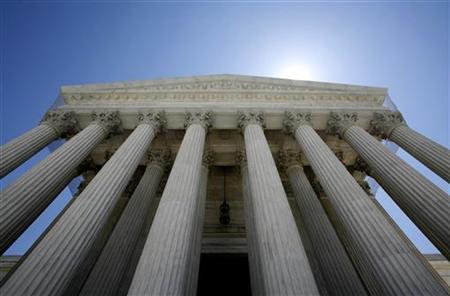
A decision in the case against Ball State University, brought by a black catering assistant named Maetta Vance, could clarify how readily harassment victims may hold deeper-pocketed employers accountable under federal law.
Several justices
questioned where best to draw the line, a task made harder by the
agreement of the parties arguing in court that the standard set by the
7th U.S. Circuit Court of Appeals in Chicago in dismissing Vance's case
was too strict.
In that June 2011 ruling written by Judge Diane Wood, considered one of its more liberal members, the 7th Circuit
said that to be a supervisor, an employee must have the power to hire,
fire, demote, promote, transfer or discipline the victim.
Three federal appeals courts have adopted this
standard, while three others have said day-to-day oversight is enough to
result in liability. A definition proposed by the Equal Employment
Opportunity Commission resembles the latter standard.At Monday's oral argument, Chief Justice John Roberts suggested to Vance's lawyer Daniel Ortiz that the 7th Circuit standard might prove workable.
He posed a scenario in which the most senior of five employees assigned to work in a single room gets to choose the background music, and tells a colleague: "I know you don't like country music; if you don't date me, it's going to be country music all day long.
"I would have thought, under your theory, that means that senior employee is a supervisor," Roberts said. "I would have thought the benefit of the 7th Circuit was that you don't have to go on a case-by-case basis."
Some justices
suggested other scenarios, including whether a person becomes a
supervisor by having authority to control a thermostat, or decide which
employee must work in the only office without air conditioning.
In contrast, Justice Elena Kagan suggested that the 7th Circuit test might be too lenient on employers.She said, for example, that a university could be freed from liability if a professor subjected a secretary to "living hell, complete hostile work environment on the basis of sex," solely because the secretary could not be fired by the professor, but rather by the head of secretarial services.
SLIDING SCALE
Vance, a black
catering assistant at Ball State in Muncie, Indiana, who prepared
everything from boxed lunches to formal dinners, had claimed she faced
racial epithets and threats of physical harm at work.
Many of her
problems stemmed from her dealings with Saundra Davis, a white woman she
viewed as a supervisor. She said general manager Bill Kimes, also
white, did not protect her and treated other workers better.
Vance said Ball State eventually retaliated against her
complaints by making her a "glorified salad girl" who cut vegetables
and washed fruit, despite a recent promotion.Justice Samuel Alito suggested that this might not be enough to subject Ball State to liability.
"What is the most
unpleasant thing that Davis could have assigned?" he asked. "Chopping
onions all day, every day?"
Ortiz said the standard was not that precise, and that
courts would have to use a "sliding scale of negligence" to review
harassment claims.He said a person who oversees a victim's work and can "instill either fear into the victim (or) control the physical location of the victim" would qualify as a supervisor.
INCOMPLETE ANSWER
Gregory Garre,
arguing for Ball State, said the 7th Circuit standard was not a
"complete answer," and that a harassing employee whose control of a
victim's work meaningfully aided the harassment could subject an
employer to liability.
But he said that Davis, under any definition, did not qualify as a supervisor, and therefore that Vance must lose.
With the parties in
agreement that the 7th Circuit test was too restrictive, some justices
suggested possible concern about having taken the case to begin with,
given that the Supreme Court does not generally issue "advisory" opinions.
Alito asked "why
shouldn't we just remand" to more fully develop the record, while
Justice Antonin Scalia said, "There's nobody here defending the 7th
Circuit" in the courtroom.
The federal
government officially supported neither party, suggesting that the
similar standards proposed by the EEOC and the 2nd U.S. Circuit Court of
Appeals in New York might be appropriate.
"Control over daily
work activities is where we would draw the line," Deputy Solicitor
General Sri Srinivasan said.
Several women's and
civil rights groups supported Vance's appeal, while the U.S. Chamber of
Commerce, the National Retail Federation and various conservative
groups supported Ball State.
A decision is expected by the end of June.
The case is Vance v. Ball State University, U.S. Supreme Court. No. 11-556.

No comments:
Post a Comment